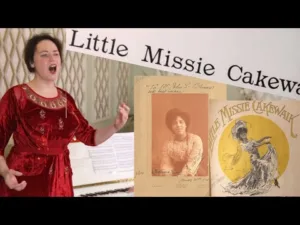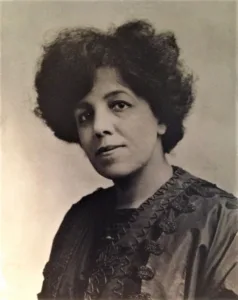Amanda Aldridge: Amanda Aldridge was a remarkable stage actress who broke down barriers and challenged racial stereotypes in the 19th century.
Despite her talent and accomplishments, she remains relatively unknown to many today. In this blog post, we will unveil 11 untold facts about Amanda Aldridge, giving you a glimpse into the life of this extraordinary woman.

1. Early Life and Family
Amanda Aldridge was born in 1860 in New York City to Ira Aldridge, a celebrated African American Shakespearean actor, and Luranah Amelia Aldridge, a talented white actress of English descent.

2. Acting Debut
Amanda made her stage debut at the tender age of 14, alongside her father in a performance of “Othello” in London.
3. Breaking Barriers in Europe
Amanda’s career flourished in Europe, where she faced fewer racial obstacles than in the United States. She toured extensively, performing in leading roles in plays by Shakespeare, Schiller, and other renowned playwrights.
4. Challenging Racial Stereotypes
Amanda’s performances challenged the prevailing racial stereotypes of the time. She portrayed strong, intelligent, and complex female characters, demonstrating the full range of human emotions and experiences.
5. Language Skills
Amanda was fluent in English, French, German, and Italian, allowing her to perform across Europe and connect with diverse audiences.

6. Personal Life
Amanda married twice, first to Swedish actor and playwright August Lindberg, and later to English actor Edgar Bruce. She had two children, one from each marriage.
7. Political Activism
Amanda was a vocal advocate for racial equality and social justice. She lent her voice to anti-slavery campaigns and spoke out against discrimination.
8. Artistic Collaborations
Amanda collaborated with prominent artists of her time, including the composer Giuseppe Verdi and the writer George Bernard Shaw.
9. Legacy
Despite her accomplishments, Amanda’s contributions to the theatrical world have largely been overlooked. However, her story is being rediscovered and celebrated by scholars and artists today.
10. Posthumous Recognition
In 2019, a plaque was unveiled at the site of Amanda’s former home in London, commemorating her life and achievements.
11. Ongoing Research
There is still much to learn about Amanda’s life and career. Researchers are working to uncover lost records and shed light on her experiences.

Conclusion
Amanda Aldridge was a trailblazer who defied expectations and paved the way for future generations of actors. Her story is one of courage, resilience, and artistic excellence.
By learning about her life and legacy, we can better understand the history of theatre and the ongoing struggle for racial equality.
Beyond the 11 Untold Facts
These 11 facts offer a brief glimpse into the extraordinary life of Amanda Aldridge. However, there is much more to discover about this remarkable woman. We encourage you to explore the resources listed below to learn more about her:
- Books:
- “The Lives of Ira Aldridge” by Bernard L. Peterson, Jr.
- “Shakespeare and Race” by Kim Hall
- Websites:
- The Ira Aldridge Society: https://en.wikipedia.org/wiki/Ira_Aldridge
- Black Past: https://www.atlasobscura.com/articles/ira-aldridge-black-actor-shakespeare-african-american
By learning about Amanda Aldridge, we can celebrate her achievements and continue to fight for a world where all people are treated with dignity and respect.
We hope this blog post has inspired you to learn more about Amanda Aldridge. Please share this post with your friends and family to help spread her story.
Additional Information
In addition to the 11 untold facts, here are some other interesting details about Amanda Aldridge:
- She was the first African American woman to play the role of Juliet in Shakespeare’s “Romeo and Juliet.”
- She was a close friend of the writer W.E.B. Du Bois.
- She received numerous awards and accolades for her acting, including the Order of Leopold from the King of Belgium.
- She died in London in 1932 at the age of 72.
Final Thoughts
Amanda Aldridge was a remarkable woman who made a significant impact on the world. Her legacy continues to inspire us today to fight for equality and justice.
WRITTEN BY ALEX
FAQs and answers
1. Who Was Amanda Aldridge?
Amanda Aldridge (1866–1956) was a British opera singer, composer, and teacher. She was the daughter of African-American actor Ira Aldridge and is best known for her compositions under the pseudonym Montague Ring. She composed romantic parlor music and became an influential voice coach.
Reference: BBC History
2. What Was Amanda Aldridge’s Contribution to Music?
Amanda Aldridge composed over 30 songs and instrumental pieces, primarily in the romantic parlor music style. She also trained notable Black artists like Paul Robeson and Marian Anderson. Her work contributed to the development of Black British classical music.
Reference: The Guardian
3. Why Did Amanda Aldridge Use the Pseudonym Montague Ring?
Aldridge used the pseudonym Montague Ring to navigate racial and gender biases in the classical music industry of her time. By adopting a name that concealed her African heritage and gender, she was able to gain wider recognition for her compositions.
Reference: Classic FM
4. Did Amanda Aldridge Ever Perform as an Opera Singer?
Although she trained as a contralto, Aldridge’s singing career was cut short due to a throat injury. Instead of performing, she turned to composing and teaching, making a significant impact in both fields.
Reference: Smithsonian Magazine
5. What Are Some of Amanda Aldridge’s Most Famous Compositions?
Some of her most well-known pieces include:
- “Three African Dances” – Inspired by African rhythms
- “Lazy Dance” – A lighthearted composition
- “Little Missie Cakewalk” – A lively dance piece
Her music blended classical techniques with African-American musical influences.
Reference: Oxford Music Online
6. How Did Amanda Aldridge Influence Future Generations?
Aldridge mentored many Black classical musicians, ensuring that talent from underrepresented backgrounds had opportunities in music. Her teachings helped shape the careers of famous figures like Paul Robeson and Marian Anderson.
Reference: British Library
7. Why Is Amanda Aldridge Important Today?
Amanda Aldridge’s legacy is significant in the ongoing recognition of Black composers in classical music. Her works are being rediscovered and performed more frequently, shedding light on her overlooked contributions.
Reference: Royal Academy of Music

